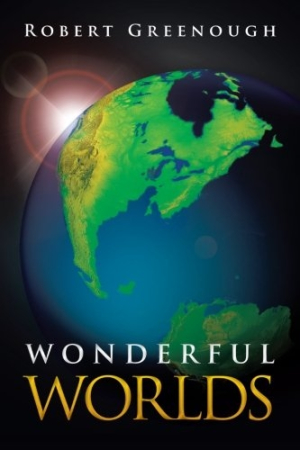Wonderful Worlds
“Intelligent evolution” is Robert Greenough’s take on how the world and its inhabitants came into being. “This is not a scientific textbook,” admits Greenough of his single-volume survey of the world from before the Big Bang to what he predicts as the coming age of “Homo Roboticus.” Despite many chapters devoted to pondering the question of the soul, Wonderful Worlds is not a religious tract.
Greenough devotes long sections to questioning whether man has a soul and, if so, what it might be. He believes that there is a god of some form and that the soul “is a portion of God in each of us.” That god portion “exists within the psyche” and is “unique to humans,” writes the author.
In his five-part, thirty-six-chapter book, Greenough sifts through many theories and myths of how the earth was created and how humans came to be as they are today. The author believes in evolution, but also that evolution was nudged in a particular direction by a higher being.
While his “mathematical support of intelligent design and planned evolution” is more speculation and opinion than science, Greenough does make many cogent arguments. Perhaps his best is this: “Imagine a junkyard that contains all the bits and pieces of a Boeing 747 airplane, dismembered and in disarray. A whirlwind happens to blow through the yard. What is the chance that after passage of the whirlwind, a fully assembled 747, ready to fly, comparable to how Modern Man now lives, will be found standing there? Without intelligence and a plan, life as we know it would be highly improbable.”
Greenough presents an argument that man did not necessarily come “out of Africa” but may instead have evolved independently and simultaneously in small communities in different regions. So too does he speculate that instead of a single massive Big Bang there were “islands of energy” that erupted over billions of years in a cascade of smaller Big Bangs, and that these multiple releases of matter and energy are what formed the universe and the planet on which humankind evolved.
There is a lot of science in this book, most of which has appeared elsewhere. The author is lax in attributing his data—there are no footnotes and the bibliography is a sketch list rather than a proper record of sources.
Greenough has put many of these ideas to pen before, in some of his previous eighteen works, most of them unpublished. While perhaps not serious enough for scientists, Wonderful Worlds is solid enough to spark intelligent conversations.
Reviewed by
Mark McLaughlin
Disclosure: This article is not an endorsement, but a review. The publisher of this book provided free copies of the book and paid a small fee to have their book reviewed by a professional reviewer. Foreword Reviews and Clarion Reviews make no guarantee that the publisher will receive a positive review. Foreword Magazine, Inc. is disclosing this in accordance with the Federal Trade Commission’s 16 CFR, Part 255.

